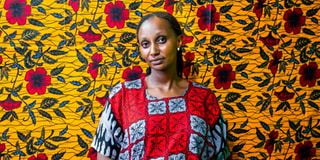The journalist changing Rwanda’s media landscape

Mutesi Scovia, Rwandan Independent Journalist.
Scovia Mutesi is shaping coverage of Rwanda’s gender issues.
A renowned and award-winning journalist who refused to let a “No” to her gender-inclined story ideas diminish her desire to tell them.
For the nine years that she worked as a print and broadcast journalist across various media houses in Rwanda, one thing remained constant: under-reporting of gender issues.
By 2018, she had had enough of the resistance. At the time, she was an editor-in-chief at a local television station but even in her decision-making position, her ideas would still be shot down by fellow male colleagues.
“They would scold me: ‘Scovia please, women stories are just too many,’” she says.
And out of her frustration, Mama U Rwagasabo, which she translates to Mothers of Rwanda was born. With the news website, she has offered an alternative platform for unlimited coverage of women and girls’ stories, she says.
“I am the managing director, I make decisions on the stories to be published,” says Ms Mutesi who officially launched the website in 2018.
She, however, resigned in 2020 from her editor-in-chief position to fully focus on the management of the online platform.
According to Rwanda Media High Council, 2019 report on gender status in Rwanda’s media, Rwandan female media practitioners were found to be missing in what is defined as the ‘most prestigious’ category of news reporting - politics and government programs.
It found that they are most attracted by fashion at 45.3 per cent, health (18.6 per cent), religious (8.1 per cent) and news presentation (5.6 per cent).
However, only 2.5 per cent cover politics, economics (1.2 per cent) and investigative stories or hard news (2.5 per cent).
Based on the report, as at 2019, there were1,025 accredited journalists out of which 244 were women and 781 were men.
Also Read: Protect women from workplace sexual violence
Already, 17 women who own online media outlets have formed a union dubbed Association of Women Media Owners for Change, to change this pattern.
“We want to be models of change. Encourage more women to do not just gender stories, but politics and investigative stories,” says Ms Mutesi, the association’s treasurer.
Nkombo Island located in Rusizi District, Western Province of Rwanda.
It has also had an impact on the community.
“If you go there now, you will find many NGOs sensitising the community on ending child marriage. That is something I am proud of. I have touched the lives of the girls there,” she says.
She also mentions that the mayor of the district had hinted at making her the island’s ambassador to campaign against child marriage.
Her greatest concern though is the burden of sexual harassment on the women journalists.
“Women journalists opt not to attend some events because they fear being sexually harassed,” she says.
“They are also harassed in the office and at home, and their spouses raise doubts about their work environment. Those who can’t handle the pressure leave to do public relations, yet journalism is equally a good profession to pursue.”




